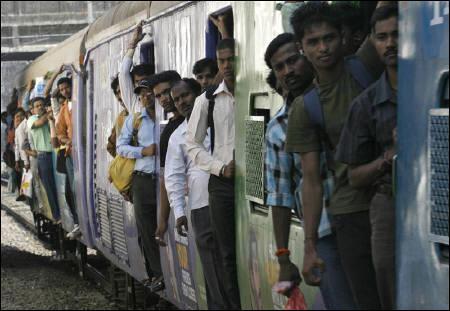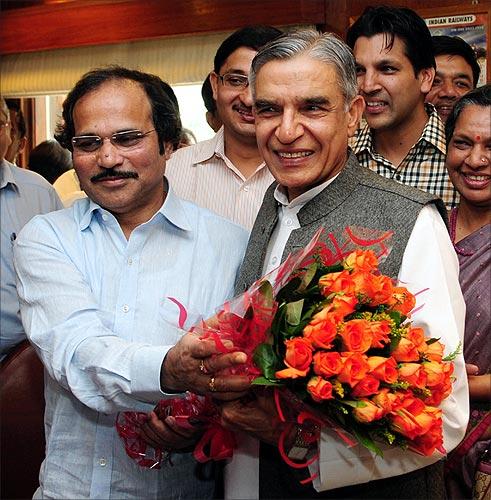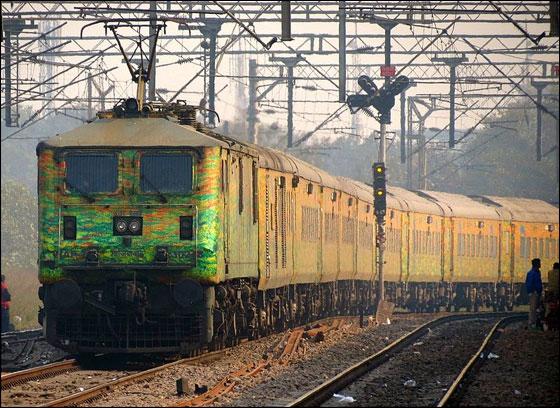 | « Back to article | Print this article |
Passenger rail fares hiked across the board
In a rare decision just a month ahead of the Budget, Railway Minister Pawan Kumar Bansal on Wednesday effected an across-the-board hike in fares of all classes from midnight of January 21 to net an additional Rs 6,600 crore (Rs 66 billion) a year, the first such increase in a decade.
The proposals will rake in additional Rs 1,200 crore (Rs 12 billion) between January 21 and March 31 this year, the minister said announcing the decision and did not rule out a hike in the freight tariff.
Fares of ordinary Second Class (suburban) trains will go up by 2 paise per km while for non-suburban travel it will be 3 paise.
Travel by Second Class Mail and Express trains will be costlier by 4 paise per km, while it will be 6 paise in Sleeper Class.
Travellers by AC Chair Car and AC Three Tier will have to shell out 10 paise more per km, first class by 3 paise, AC Two Tier by 6 paise and AC First Class by 10 paise.
The fares for First Class, AC Two Tier and AC First/Executive class were already raised by 10 paise per km, 15 and 30 paise respectively in the current year's budget.
Breaking away from the populism of his predecessors, including Lalu Prasad and Mamata Banerjee, Bansal, who was made the Railway Minister in October last, told a press conference that the decision to hike the fares was "imperative" as lack of revision in the last 10 years has had a "telling effect" on the railway finances.
Dinesh Trivedi, who succeeded his party chief Banerjee, made a bold decision to hike fares in the Budget in February, 2012 to mop up an additional Rs 4,000 crore (Rs 40 billion) but paid the price when he was made to resign by his party Trinamool Congress which was opposed to it.
Click NEXT to read further...
Passenger rail fares hiked across the board
Wednesday's decision also covered services like Rajdhani, Shatabdi and Duronto type trains. However, it exempted platform tickets from any hike.
Bansal also proposed to do away with the practice of levying development charge on passenger tickets and all the chargeable fares will in future be in multiples of five.
As a result of the proposed hike, ordinary Second Class suburban fares for a distance of 35 km will go up by Rs 2 from Rs 8 to Rs 10, while in the non-suburban trains it will go up by Rs 5 for an average distance of 135 km.
In Sleeper Class, the increase would mean a hike of Rs 50 for a distance of 770 km from Rs 270 to Rs 320. In the case of AC Chair Car, for a distance of 387 km, the increase would be Rs 40 from Rs 345 to Rs 385.
In the case of AC Three Tier, for a distance of 717 km, the fare will go up from Rs 724 to Rs 800, an increase of Rs 76.
Similarly, in the case of AC Two Tier, the increase would mean a hike of Rs 48 for a distance of 721 km, while for AC First Class it will be Rs 56 for a distance of 547 km.
Replying to questions, Bansal said the Railway Budget next month will not propose any fresh hike in passenger fares.
But when asked whether there would be hike in the freight tariff, he was non committal. "I am not saying anything either way. We are not saying anything now."
Click NEXT to read further...
Passenger rail fares hiked across the board
Giving reasons for the decision, which he described as reasonable, the minister said the losses in passenger segment, which was Rs 1,059 crore (Rs 10.59 billion) in 2004-05, rose to Rs 19,964 crore (Rs 199.64 billion) in 2010-11, an increase of 18 per cent a year. This is likely to go up to Rs 25,000 crore (Rs 250 billion) in the current fiscal.
Bansal said input costs have increased immensely over the years and the fares had remained stagnant or there was a little decrease in the lower class fares.
He said Railways was making efforts to raise revenues to meet urgent safety and user amenities requirements.
In addition, the Sixth Pay Commission meant an additional outgo of Rs 73,000 crore (Rs 730 billion) in the five year period and about Rs 1 lakh crore (Rs 1 trillion) till this time.
Bansal also said the freight traffic target could also not be met with the load showing a shortfall of 13 million tonne till December end.
The cross subsidy through freight business was no more viable in view of the fast evolving competition from other modes.
The across-the-board fare hike proposal of Dwivedi in the current year's budget was finally approved only for First Class, Second AC and First AC/Executive Classes, which together constitute only about 0.3 per cent of total passengers and about 10 per cent of total earnings from passenger segment.
He said internal resource generation has been seriously impacted resulting in scaling down of Annual Plan size. Fund balances turned negative in 2011-12, adversely affecting essential replacement and renewal of assets, operation and maintenance activities and critical safety and passenger amenity works.


